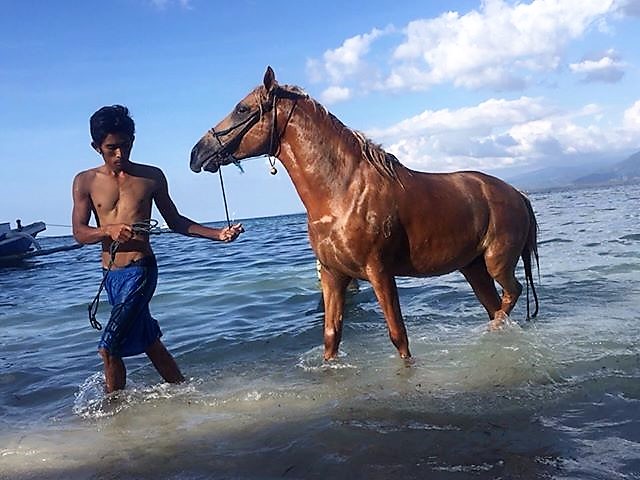
The mass expansion of tourism on the motorless Gili Islands, Lombok is giving local ponies a hard time.
Recently I spent a few days on the Gili islands during a lengthy trip visiting Lombok island and it was fascinating to see the ponies and brightly coloured carts locally known as the “Cidomo”. They are literally the workhorses of the islands which have no motorised transport, although electric-powered scooters are now making their presence known. All supplies for the islands arrive by boat and almost everything is then transported to their final destination by the “Cidomo’, including the tourist hordes who are laden down with their luggage.

There are many social media and internet sites set up by tourists who have visited the islands decrying the way these ponies are cared for, but ironically in the case of the Gilis it is the pressures of increasing tourism which is causing many of the problems. I have read posts by horse lovers who on one hand hypocritically condemn their use but still cannot resist using them.Most if not all the ponies are in good bodily condition, but it is the way they are driven and loaded which is unsatisfactory. Some of the problems are the result of lack of knowledge and education of the owners and drivers.
The need for evermore guest houses and hotels is one main cause of their overloading with cement, roofing and other building materials and also supplies to keep the tourists happy and healthy such as bottled water and beer. The building spree is also taking away grazing and exercise land for them.
Another problem is the unnecessary overloading by the tourists themselves by their insistence of squeezing four people into a cart with their baggage to save money and by agreeing to pay outlandish fees which only encourages more Cidomos over to be brought to the islands as owners and drivers see this trade as easy money from gullible tourists.

A third issue is the young immature drivers using them to race round at high-speed along the narrow, rutted island streets and tracks, often with the misguided encouragement of the tourists treating it like an adventure theme ride. This becomes a danger to tourists wandering the streets and no doubt must cause the occasional accident. In fact, the driver’s haste is to get back for another fare before the new arrivals do the sensible thing and walk the short distance to their hotel. Most hotels are within walking distance.
The Gilis are a typical example of how tourists visiting an increasingly overloaded tourist destination can inadvertently encourage the abuse of local animals through ignorance of animal welfare issues. In this case it is the lazy tourist who on arrival by ferry at the harbour find lines of cute Cidomos and mistakenly want to take part in what they believe is a bit of local tradition. The more lazy among us also find it easier in the heat to make use of them instead of walking. It is possible to alleviated the situation by only using the carts to carry their bags and walking beside it, but few think of this.

The Gili island cidomos were not put there as a tourist attraction but are a traditional local form of transport that have been in use by the local Sisak people thoughout recent history and are still widely used all over Lombok and other islands providing a taxi service for many of the poverty-stricken residents. Compared with the ponies on the Gilis these are the ones that are really suffering and where the focus for concern is required.
Many local residents rely on this cheap form of taxi service on Lombok.
The Gili ponies are not as bad off as those on Lombok and other islands which most tourist either do not see or take notice of. We had the time and inclination to visit the suburbs, communities and markets of Mataram the capital of Lombok interacting with the local people, where it was obvious that there was a great need for the use of Cidomos, which suffer greatly from overloading, the dangers of heavy traffic and poor husbandry. They offer cheap vital transport for poorer people and suffer far greater hardships than those on the Gilis.

There are many campaigns and social media reports of the cruel treatment of Gili ponies, some of which is well-founded but much of it is overstated and out of context. Rarely do you hear about the plight of those on mainland Lombok who are in more urgent need of help. There are charities and organisations attempting to ease some of the hardships which are worth supporting, but tourists also have a responsibility to lessen their load by not using them out of laziness or for photo opportunities.
When we arrived on the Gilis we struggled the 800 yards on foot to our guest house in the heat, while others zipped by on the Cidomos and yes it was a struggle, but our consciences were clear.